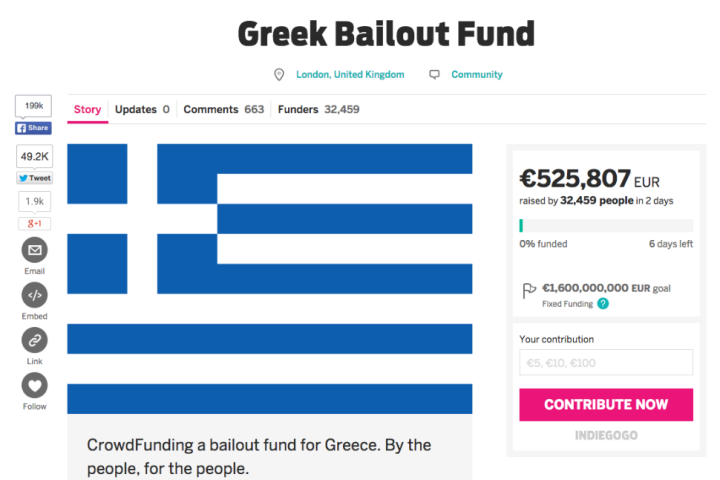
Whether the bold Indiegogo campaign started out as a bit of a tongue-in-cheek effort isn’t clear. What is clear, however, is that it’s struck a chord with like-minded folks around the world, with donations hitting an astonishing €525,000 (about $585,000) in just two days.
What Indiegogo described as “overwhelming worldwide interest” caused the the campaign’s site to crash early Wednesday as more than 32,000 generous donors rushed to rescue the Greek economy.
Titled “Greek bailout fund – by the people for the people,” London-based shoe seller Feeney, who insists his effort is serious, told ABC Australia it was the first time he’d set up a crowdfunding campaign.
Fed up with watching politicians “going around in circles and dithering somewhat,” he decided the crisis just needed “someone to step in and sort it.” And so the plan to bail out Greece was born.
“I think the people of Europe can do that much quicker than the politicians can,” 29-year-old Feeney said. “The amount that we need is only €3.19 per EU citizen, so it’s just a small amount.”
As usual, perks for donors depend on the size of the pledge and include, for example, a postcard of the Greek Prime Minister (yes, that’s at the bottom end of the scale), a feta and olive salad, a bottle of Greek wine, and a holiday for two in the Mediterranean country.
Indiegogo’s terms state that donations must be refunded if the target isn’t reached within the campaign period.
Sadly, with only 0.3 percent of the target amount so far pledged – and the not insignificant matter of Greece having just failed to pay the IMF – it looks like the writing’s on the wall for Feeney’s campaign.
However, the shoe seller remains unperturbed, saying that whatever happens, “it has made a bit of a statement that real people do care about other people across Europe.”


